Appcelerator just released the latest of its quarterly developer surveys - which we always look forward to for two reasons. First, Appcelerator tends to pull in large enough panels of respondents to make its surveys quite accurate in what it looks to predict. And second, it almost always manages to uncover some meaningful developer insights. It is no different this time around.
Appcelerator turned its survey into an infographic, which we've dissected to uncover the meaningful nuggets of info contained in it. First, the survey included 804 mobile developers and the enterprise people they work with - once again a hefty enough number to provide a high degree of certainty on outcomes. Below is shown the actual makeup of the panel.
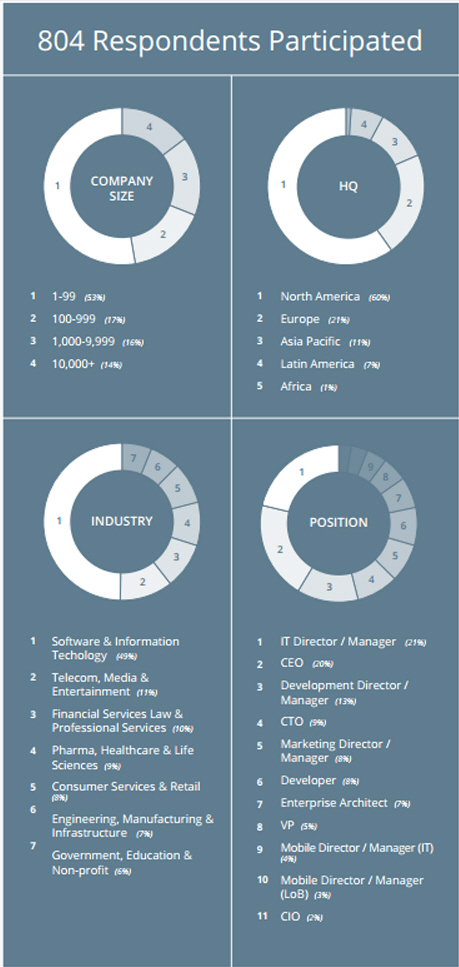
One series of questions Appcelerator asked were generally focused on who owns the strategic mobile initiatives. This is an interesting question. Recently we wrote about the struggle between CIOs and CMOs vying for ownership of mobile Web strategies - a battle that CMOs, by the way, appear to be winning. What Appcelerator uncovered in the graphic shown below is that basically mobile strategy ownership is still up for grabs in a, perhaps surprisingly, large number of companies.
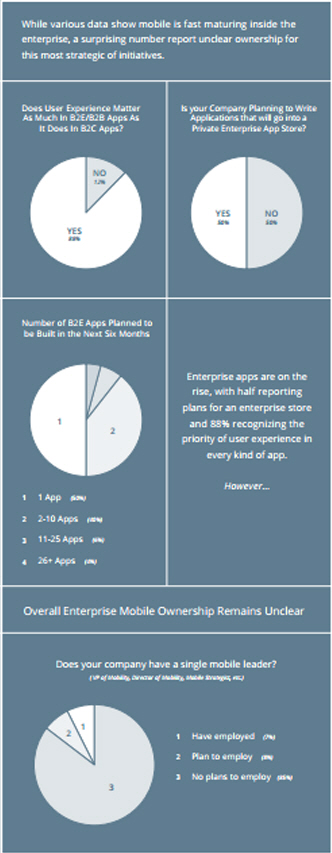
As the charts above show, approximately 40 percent of businesses intend to deliver at least two and as many as 10 mobile apps over the next six months. At least all businesses plan to deploy their own app store and a huge percentage understand that the user interface and user experience is critical to any mobile app - whether B2C, B2B or B2E in nature. These are significant indications that there needs to be someone specifically in charge of mobile initiatives, but the survey results suggest that a surprisingly large number of businesses still don’t have this figured out.
The next survey segment, shown below, is quite interesting. It clearly points out that what have been core issues within businesses for the last five years or so - including BYOD, mobile app development platforms and the management of devices, is beginning to give way to other concerns. This suggest to us that enterprises do see mobility as having gone mainstream - which never the less leaves us doubly scratching our heads concerning the lack of mobile leadership highlighted earlier.
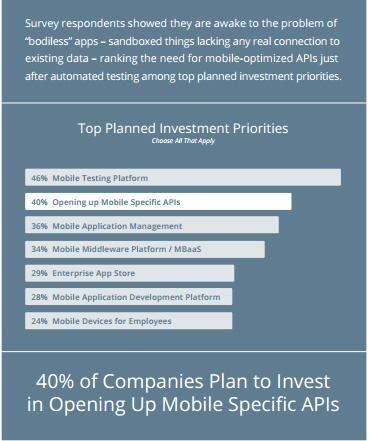
It is also of particular interest that mobile testing platforms top the list for short-term investments. This happens to dovetail precisely with the fact that almost all businesses understand the importance of the user experience. Only thorough testing and vetting of the UI and UX can ensure that mobile apps will meet and possibly even exceed user expectations. Mobile optimized APIs would of course greatly help deliver on the promise.
The next survey segment, shown in the chart below, focuses on the obligatory operating system question. The question was presented as, “How many operating systems does your company support?”
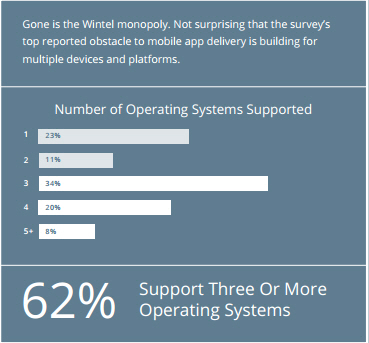
As the results show, 62 percent of all respondents claim they need to support at least three operating systems (let's guess: Windows, iOS and Android). Managing operating systems of course really means, aside from Windows, managing mobile operating systems. This leads exactly to the next relevant question, shown below.
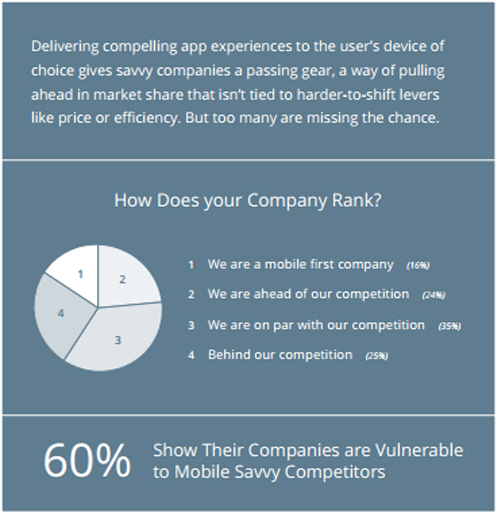
We admit that the setup to the question highlighted above here is quite overblown, not only by our own standards but by Appcelerator's usual standards as well. It's hard to let "a passing gear" slide by without comment. The breakdown on the question is more or less along the lines we anticipated - sort of. We expected more companies to fall into the second category than appears to be the case. Being on par with competitors shows a high degree of lack of leadership. Knowing one is behind one's competitors shows total lack of leadership.
Quite honestly we are appalled by that 60 percent response rate. But of course, it further reflects the survey's earlier finding that there are many companies that lack a true owner or real leadership of overall mobile strategy.
OK, finally we arrive at the real question everyone wants the answer to. Yes, Appcelerator fooled you with the first operating system question, though we knew the answers. But now we finally arrive at the real question of interest - which mobile platform (both operating system and device combination) are respondents targeting? Without further ado, the answer is shown below.
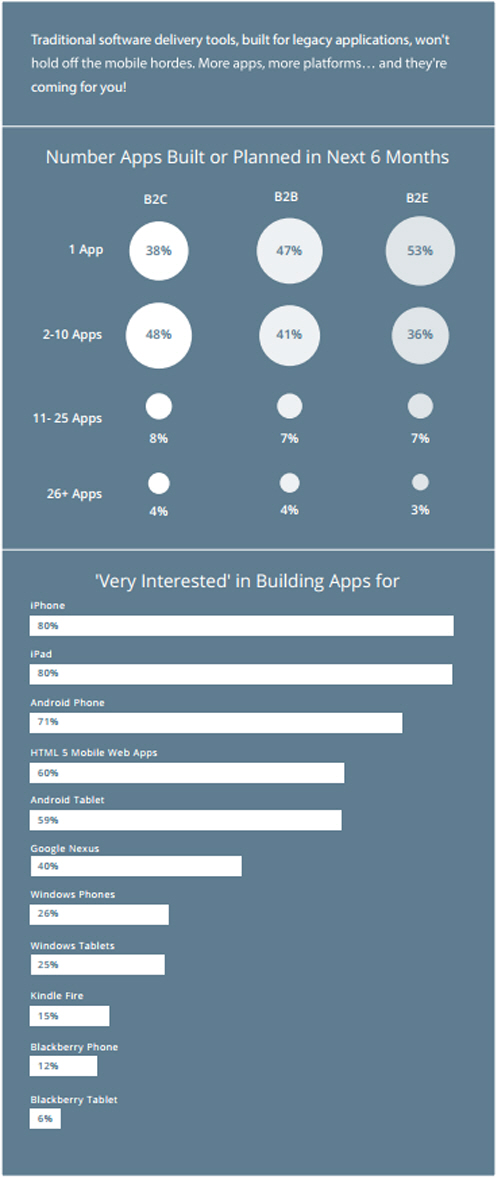
Apple's iPhones and iPads still win, though obviously Android smartphones have closed the gap. For all the noise we hear about Android tablets cracking the enterprise code, Appcelerator's survey shows they aren't really there…yet. In fact, HTML5 Web app development nudges out Android tablets as a greater target for the surveyed businesses. Finally, Windows re-enters the picture following Android tablets. If we had to guess - and we will - by this time next year we will likely see Windows smartphones and tablets turn up ahead of Android tablets and we believe Android smartphones are likely to see a decline as well at the expense of Windows Phone 6 (and next-generation releases of Windows Phone). Apple still rules.
There you have it for Q3 2013. Appcelerator is a good sport in sharing its surveys and in developing the graphics shown here. Because of that we'll show one last graphic - what Appcelerator itself offers platform-wise to all those businesses that are mobile leaders.
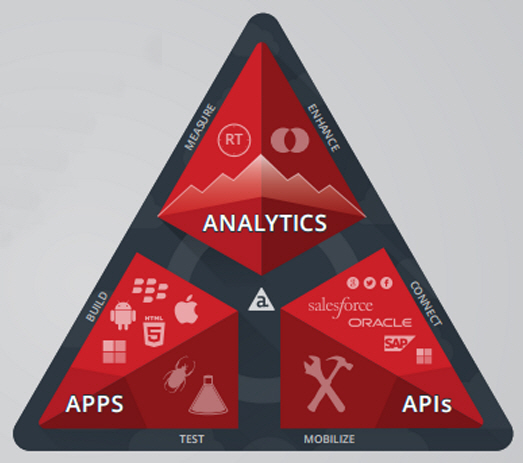
And for all those mobile businesses that are appalling laggards - pay attention: perhaps Appcelerator has what you need to join the enterprise mobile club. Sooner than later.
 QUICK LINKS
QUICK LINKS